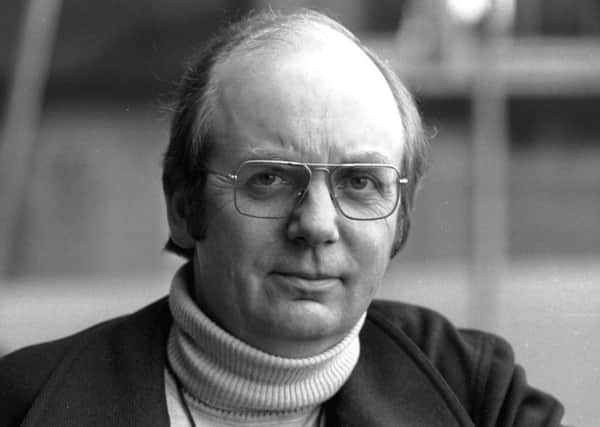Obituary: Conrad Wilson, former music critic with The Scotsman


Five years ago I dedicated my Saturday music column to a new book chronicling the history of the Perth Festival of the Arts. Its author was Conrad Wilson, former music critic of The Scotsman, and to accompany the article Picture Desk had sourced a seriously severe monochrome photo, taken during his earliest days with the newspaper in the 1960s, which, even by his own reckoning, was truly fearsome.
“I often wondered why people seemed reluctant to approach me,” Wilson jested the next time we met. “Did I really look so austere?”
Advertisement
Hide AdAdvertisement
Hide AdThose who knew Wilson well saw something very different. Yes, he had a distant demeanour, but it was mainly the result of deep, intellectual consideration. And I certainly recall our first meeting, on Kirkwall’s Broad Street during a St Magnus Festival sometime in the early 1980s, recognising instantly that I was being sized up as a new kid on the block.
But the man I came to know was generous with his time and knowledge, a caring family man, and – as the years passed, the physical features softening, and the dapper hat adopted – the complete antithesis of that astringent Scotsman photo. His death represents the passing of a genuinely considerate man and giant among critics.
Reading Wilson’s impeccable copy was both a joy and an education. As a voracious reader, he knew his subjects inside out. He had a phenomenal memory that enabled him to retrieve the most obscure information at the drop of a hat. Long-time friend and former Guardian critic Gerald Larner recalls Wilson’s detailed tales of national service days in Paris with the RAF.
“He could not only tell you the exact food he ordered, but the names of the waiters who served it,” says Larner. Food was another passion, one Wilson wrote colourfully about in Gut Reaction, his regular food column for The Scotsman.
He could, and did write about many things. But the Scotsman music critic post, which Wilson occupied from 1963-91, was a boyhood dream come true. Musical influence came from his grandfather, a violinist who encouraged him to learn the piano, a craft Wilson reserved for private, informal occasions.
As a pupil at Daniel Stewart’s College, legendary music master Eric Reid encouraged him to write about music, resulting in finely tuned reviews for the school magazine. Aged 15, Wilson attended the opening concert of the very first Edinburgh International Festival, beyond which he never missed a single Festival until ill health intervened.
On leaving school, he trained as a journalist with the Edinburgh Dispatch. The reason he signed up for the now defunct evening paper was his fear of riding a bicycle, which was a prime requirement for doing essential night duty on the Dispatch’s sister daily, The Scotsman. Wilson never, as a rule, undertook anything he felt uncomfortable with.
The Dispatch’s charismatic editor Albert Mackie gave him plenty space to hone his critical skills, sending him to review performances as far afield as London’s Covent Garden. National Service took Wilson to Paris, an eye-opening experience that made the resumption of his traineeship in Edinburgh seem like a step backwards. Before long he was off to Amsterdam as programme editor for Philips Records, writing with equal ease on jazz and pop.
Advertisement
Hide AdAdvertisement
Hide AdWilson’s reviews reflected an honest, independent mind. His job, he felt, was to say it as it was: strongly held views, candidly argued, wrapped in seamlessly crafted prose. His intention was never to offend, simply to inform. Working on sleeve notes at Philips required him to wax lyrical about artists or performances he didn’t necessarily rate. Integrity dictated he move on.
After a spell as sub-editor in the BBC’s London newsroom, a conversation with The Scotsman’s London Editor, Eric Mackay, resulted in his appointment as the paper’s London-based Cultural Correspondent.
When Christopher Grier resigned in 1963, Conrad snatched the opportunity to head back north. “To be music critic of The Scotsman in its heyday was the job I had envisaged since boyhood,” he recently reminisced.
The 28 years he spent as the paper’s staff critic coincided with a tectonic shift in Scotland’s musical ambitions. Sir Alexander Gibson’s regenerating influence on the Scottish National Orchestra, and his indefatigable drive to create Scottish Opera, lay at the heart of an explosive musical renaissance, which in turn spawned a whole new school of home-grown composers.
More importantly, his vast musical knowledge and open outlook allowed Wilson to place all that within the context of the wider musical world. He delighted in the fact The Scotsman provided him with a budget each year for “international travel”.
As one of the chief chroniclers of the era – the other was his west coast sparring partner at the Glasgow Herald, Malcolm Rayment, followed by the rampantly populist Michael Tumelty – Wilson’s authoritative journalism remains a powerful instrument of record. Add to that his wider influence as a scrupulous programme editor of the Edinburgh Festival during Peter Diamand’s directorship, and the 19 books he penned, among them a highly regarded study of Puccini, an affectionate biography of Sir Alexander Gibson, and numerous highly readable composer studies.
After retiring from The Scotsman, he continued as a freelance critic for the Herald.
He remained a compulsive writer, and even when health problems made it difficult for him to get out, he created his own blog, in which a series of personal reminiscences hinted at an evolving autobiography. Alas, it never materialised.
Advertisement
Hide AdAdvertisement
Hide AdHis website photo shows a hugely contented man with an eccentric floppy hat, a knowing smile and kind, faintly mischievous eyes. For me, that was the real Conrad.
Wilson is survived by a son and daughter from his first marriage to Ruth, and by his second wife Sue and their three daughters.
KENNETH WALTON